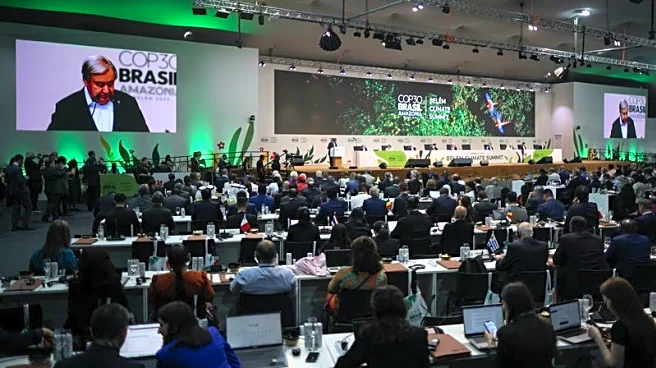By Kate Abnett, Valerie Volcovici and Johan Ahlander
BRUSSELS/BELEM (Reuters) -Governments heading to the U.N. COP30 climate summit in Brazil are bracing for the possibility that the Trump administration
may seek to disrupt negotiations at the event - even without any U.S. officials showing up.
The White House has said it will not send high-level officials to the annual conference, noting that President Donald Trump made his views clear at the U.N. General Assembly in September when he described climate change as the world's "greatest con job".
However, the U.S. retains the option to send negotiators at any point during the November 10-21 COP30 talks, ahead of the country formally exiting the international Paris climate agreement in January.
Three European officials told Reuters the EU has been preparing for multiple scenarios at COP30 - including the U.S. skipping it entirely, actively participating and seeking to block deals, or staging sideline events to denounce climate policies.
COP30 will be a test of other world leaders' willingness to step up their efforts to limit climate change, despite opposition from the U.S., the world's biggest economy and largest historical CO2 emitter.
Some governments are particularly nervous after the Trump administration intervened to sink a deal last month at the International Maritime Organization that would have resulted in a world-first carbon fee on shipping.
After U.S. threats of tariffs, port levies and visa restrictions, some countries dropped their support and the measure was delayed for a year.
"That a country begins to threaten different types of measures both against countries but also against negotiators like we saw in the IMO process ... that worries me," Norway's climate minister Andreas Bjelland Eriksen said.
The U.S. State Department did not respond to a request for comment.
PEER PRESSURE
One of the European officials said their priority would be for countries to rally together to present a united COP30 front against any anti-climate interventions from the U.S.
But they worried the threat of tariffs or visa restrictions from Washington may spook some governments into not joining any collective defence of multilateralism and the COP talks.
"If they pull the same tactics, I think there's zero chance of having any sort of rallying around the Paris Agreement in response," the official said, referring to the U.N.'s 2015 accord, which commits governments to try to limit temperature rise.
In the United States, some lawmakers urged countries to push back against any pressure.
"If you allow yourself to be intimidated by this administration, they will seize all the ground that you cede to them and then come back for more," said Senator Sheldon Whitehouse, the top Democrat on the U.S. Senate's environment committee.
This year, one diplomat from an island nation told Reuters countries are worried some governments might self-censor for fear of retaliation even if no U.S. officials are in the room.
The U.S. absence is quickly being filled by China's rising influence. The world's biggest emitter has a financial stake in the green transition continuing, because its industries dominate global manufacturing of key low-carbon technologies, from solar panels to batteries.
China's foreign ministry said Beijing firmly supports multilateralism in dealing with climate change.
"No one can afford to be left behind in tackling climate change, no nation can shirk its responsibilities," a ministry spokesperson said. "The international community must stay the course."
TRICKY TALKS
At first sight, the U.S. has less at stake in COP30 than it did at the IMO - where the proposed carbon tax would have imposed fees on U.S. industry and maritime trade.
The U.S. threatened tariffs this summer against countries that supported a U.N.-led treaty to cap plastics production, three sources told Reuters, while also sending a diplomatic memo to numerous countries urging them to reject a treaty setting plastic production caps. Those talks ended without a deal.
COP negotiations, in contrast, tend to set targets to address climate change, but leave it up to individual countries to decide how they contribute.
This year’s COP30 may be tough for any one country to influence, with the talks tackling a range of issues – from climate finance to worsening extreme weather – rather than focusing on one issue for all to agree on.
But some COP30 issues are clear priorities for Washington - including climate policies affecting trade. Any plans for countries to move ahead with the COP28 deal to transition away from oil and gas could potentially complicate U.S. relations for the EU, Japan, South Korea and others that have signed deals with the Trump administration for more U.S. oil and gas.
Despite such tensions, most countries want to preserve the COP process – which allows them to influence others and seek deals in their national interests, experts said.
"There are very few parties that have any interest in busting up the multilateral process," said David Waskow, a director at the non-profit World Resources Institute. If the U.S. interferes, he added, "I think they would find themselves isolated."
(Reporting by Kate Abnett in Brussels, Valerie Volcovici in Belem, Brazil, and Johan Ahlander in Stockholm; Additional reporting by Simon Jessop in London, Ali Withers in Copenhagen, and Ryan Woo in Beijing; Editing by Nia Williams)









